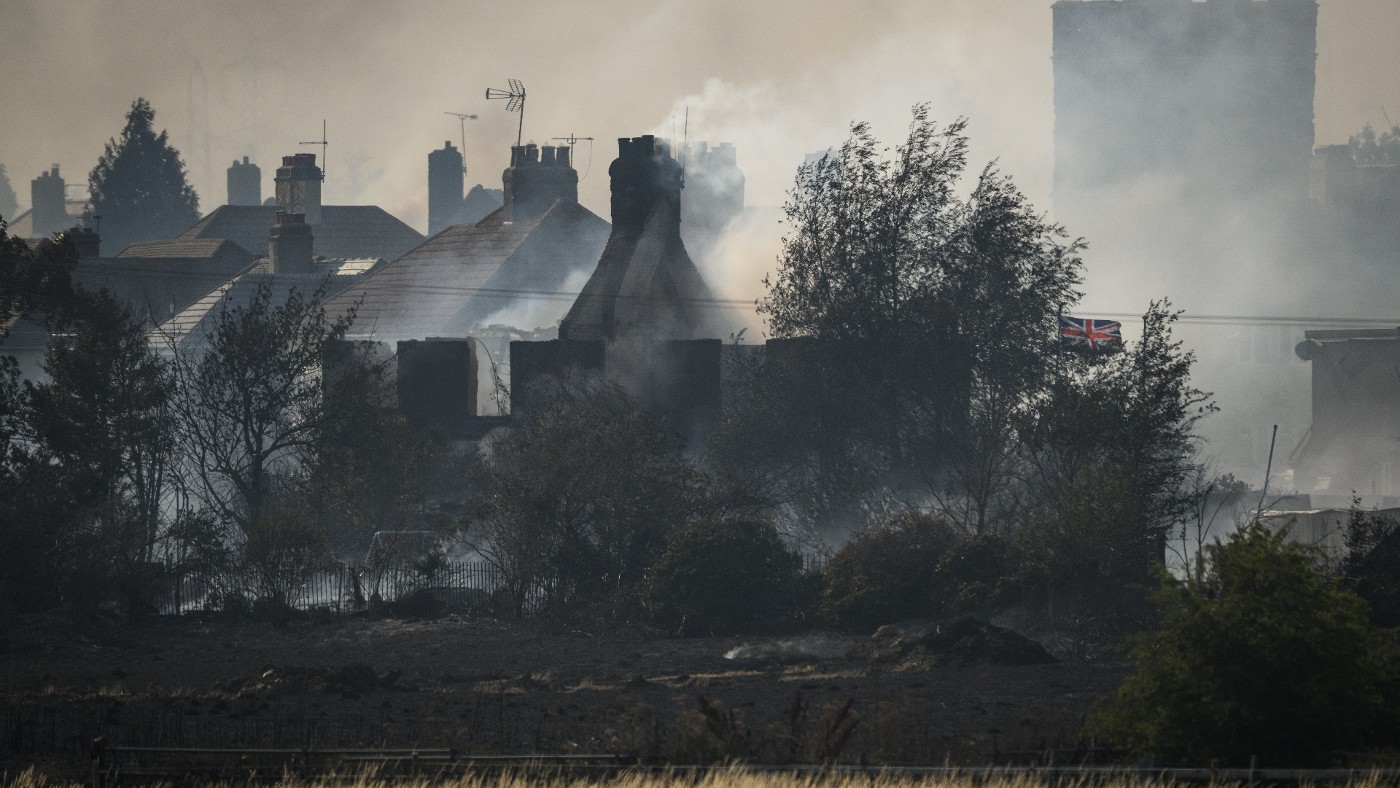When will the next record-breaking heatwave hit Britain?
Expert warns that yesterday’s high temperatures are ‘just the beginning’

A free daily email with the biggest news stories of the day – and the best features from TheWeek.com
You are now subscribed
Your newsletter sign-up was successful
Experts say there could be another heatwave in Britain as early as next month, after wildfires blazed across the country with temperatures soaring to a historic high of 40.3°C.
On a day described as a “game-changer” by a fire chief, there were major blazes in several regions including Leicestershire, Yorkshire and Norfolk. In London, firefighters had their busiest day since World War Two, said The Mirror.
Hundreds of train services were cancelled due to damage to overheard wires, tracks and signalling systems, while flights were diverted from Luton airport after heat “melted the runway”.
The Week
Escape your echo chamber. Get the facts behind the news, plus analysis from multiple perspectives.

Sign up for The Week's Free Newsletters
From our morning news briefing to a weekly Good News Newsletter, get the best of The Week delivered directly to your inbox.
From our morning news briefing to a weekly Good News Newsletter, get the best of The Week delivered directly to your inbox.
Just the beginning?
As temperatures return to more comfortable levels, Bill McGuire, professor emeritus of geophysical and climate hazards at University College London and a climate activist, warned that this week’s conditions are “just the beginning”.
Writing for The Guardian, he predicted that “when our children are our age, they will yearn for a summer as ‘cool’ as 2022” because “long before the century’s end, 40°C-plus heat will be nothing to write home about” in the “climate-mangled world they inherit”.
Summers are “set to get ever hotter and last longer, overwhelming the other seasons”, he wrote. People will sleep in gardens and parks as “baking nights make sleeping indoors impossible”. Transport and energy infrastructure will “succumb repeatedly” and “health and wellbeing services will buckle”.
With demand for food rising but crop yields plummeting there will be “widespread hunger, social unrest and civil strife” with the UK “unlikely to be immune”.
A free daily email with the biggest news stories of the day – and the best features from TheWeek.com
August heatwave?
More immediately, the next heatwave could hit Britain in August, according to the Met Office.
The chief meteorologist, Paul Davies, said that another spell of high temperatures later in summer could be on the cards. Speaking to Sky News, he said “you just can’t rule out another plume.”
The Met explained that very hot weather could return soon because a “heat dome” – a slow-moving area of high pressure from North Africa – remains in place above Portugal, Spain and France, said National World.
If there is a “wobble” in this dome, said the Met, another plume of heat could reach the UK, potentially causing another heatwave.
Professor Hannah Cloke, a natural hazards researcher at the University of Reading, told the i news site there was a “distinct possibility” of hot spells next month.
She added that it is “difficult to say” whether this week’s extreme temperatures will be repeated in August. “It’s quite a long way off and I haven’t seen anything that looks like 40°C,” she said, but added: “That doesn’t mean it won’t happen.”
Every three years?
Taking a slightly longer-term view, another expert at the Met Office said that the extreme temperatures that Britain sweltered in this week could come around on a regular cycle, noted The Guardian.
Chief of science, Prof Stephen Belcher, said that “if we continue under a high emissions scenario we could see temperatures like these every three years”.
He added that: “The only way that we can stabilise the climate is by achieving net zero.”
Chas Newkey-Burden has been part of The Week Digital team for more than a decade and a journalist for 25 years, starting out on the irreverent football weekly 90 Minutes, before moving to lifestyle magazines Loaded and Attitude. He was a columnist for The Big Issue and landed a world exclusive with David Beckham that became the weekly magazine’s bestselling issue. He now writes regularly for The Guardian, The Telegraph, The Independent, Metro, FourFourTwo and the i new site. He is also the author of a number of non-fiction books.
-
 The ‘ravenous’ demand for Cornish minerals
The ‘ravenous’ demand for Cornish mineralsUnder the Radar Growing need for critical minerals to power tech has intensified ‘appetite’ for lithium, which could be a ‘huge boon’ for local economy
-
 Why are election experts taking Trump’s midterm threats seriously?
Why are election experts taking Trump’s midterm threats seriously?IN THE SPOTLIGHT As the president muses about polling place deployments and a centralized electoral system aimed at one-party control, lawmakers are taking this administration at its word
-
 ‘Restaurateurs have become millionaires’
‘Restaurateurs have become millionaires’Instant Opinion Opinion, comment and editorials of the day
-
 Earth is rapidly approaching a ‘hothouse’ trajectory of warming
Earth is rapidly approaching a ‘hothouse’ trajectory of warmingThe explainer It may become impossible to fix
-
 The plan to wall off the ‘Doomsday’ glacier
The plan to wall off the ‘Doomsday’ glacierUnder the Radar Massive barrier could ‘slow the rate of ice loss’ from Thwaites Glacier, whose total collapse would have devastating consequences
-
 Can the UK take any more rain?
Can the UK take any more rain?Today’s Big Question An Atlantic jet stream is ‘stuck’ over British skies, leading to ‘biblical’ downpours and more than 40 consecutive days of rain in some areas
-
 As temperatures rise, US incomes fall
As temperatures rise, US incomes fallUnder the radar Elevated temperatures are capable of affecting the entire economy
-
 The world is entering an ‘era of water bankruptcy’
The world is entering an ‘era of water bankruptcy’The explainer Water might soon be more valuable than gold
-
 Fifteen years after Fukushima, is Japan right to restart its reactors?
Fifteen years after Fukushima, is Japan right to restart its reactors?Today’s Big Question Balancing safety fears against energy needs
-
 Climate change could lead to a reptile ‘sexpocalypse’
Climate change could lead to a reptile ‘sexpocalypse’Under the radar The gender gap has hit the animal kingdom
-
 The former largest iceberg is turning blue. It’s a bad sign.
The former largest iceberg is turning blue. It’s a bad sign.Under the radar It is quickly melting away